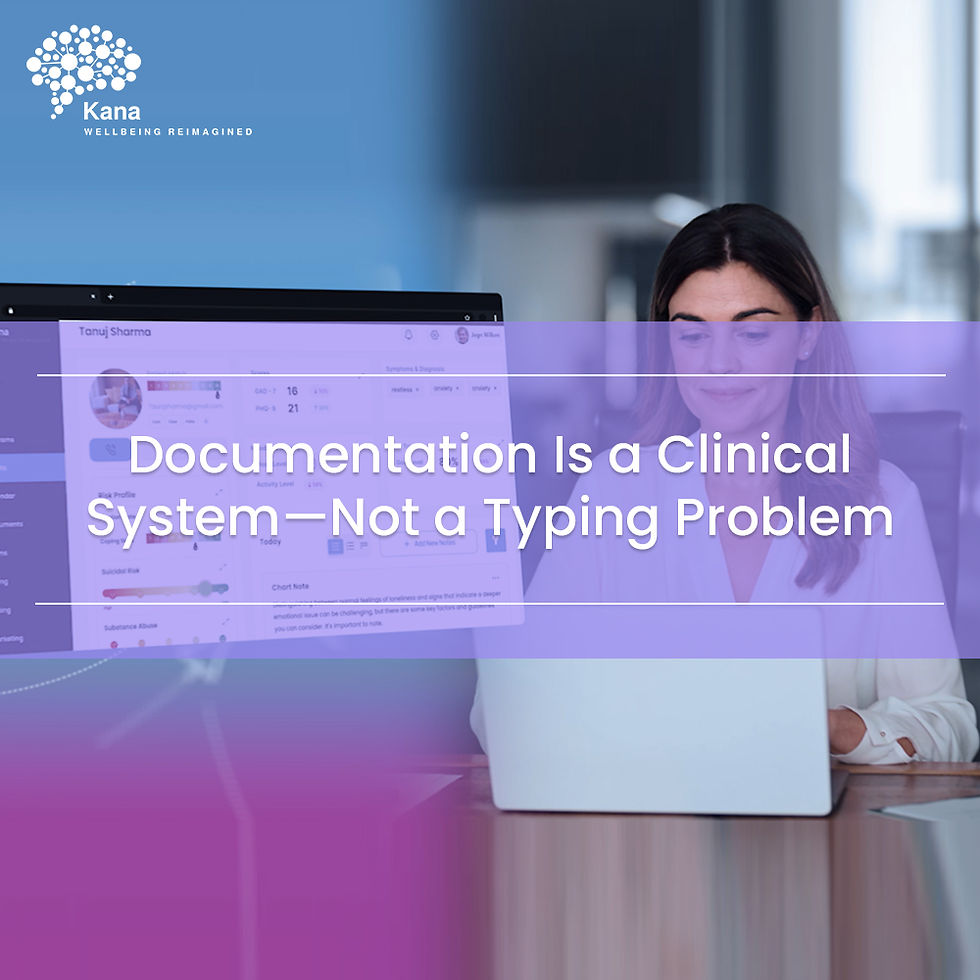From Chatbots to Copilot:How AI is Personalizing Mental Health Support
- emailvishesh
- Apr 9, 2025
- 3 min read
Artificial intelligence (AI) is transforming mental health care by providing personalized, accessible, and scalable support.From AI-powered chatbots to advanced copilot systems, technology is bridging gaps in mental health services, ensuring timely and tailored interventions.With rising demand and a shortage of mental health professionals, AI enhances the ability to provide effective care without replacing human therapists.

This article explores how AI is redefining mental health support, from real-time chatbots to advanced AI-assisted therapy tools.
1. The Rise of AI-Powered Chatbots
AI chatbots are among the first applications of AI in mental health, offering immediate, 24/7 support to help users manage stress, anxiety, and depression through conversational AI.
How AI Chatbots Are Helping:
Offer instant emotional support through natural language processing (NLP).
Provide personalized coping strategies for stress, anxiety, and sleep issues.
Encourage consistent self-care through reminders and daily check-ins.
Research indicates that AI-driven mental health chatbots can help reduce self-reported anxiety levels, particularly for individuals with limited access to therapy.
2. AI as a Mental Health Copilot: Beyond Chatbots
AI Copilot take mental health care to the next level by assisting both individuals and therapists through:
Tracking mental health trends over time.
Analysing speech, text, and behavioral patterns to detect distress.
Providing therapists with insights to personalize treatment plans.
AI-driven clinical decision-support systems improve diagnostic accuracy, helping therapists detect mental health conditions earlier and customize interventions accordingly.
How AI Copilot Enhance Mental Health Care:
Personalized AI Therapy Assistants:AI tools adapt to individual needs, offering tailored mental wellness plans.
Therapist Augmentation:AI copilot provide real-time patient insights, improving therapist effectiveness.
Early Detection & Prediction:AI identifies subtle behavioral changes linked to depression and anxiety.
3. AI-Powered Sentiment & Emotion Analysis
AI can analyse tone of voice, facial expressions, and word choices to assess mental well-being, allowing real-time mood tracking that benefits both individuals and therapists.
How AI is Personalizing Mental Wellness:
Identifies stress and emotional shifts in real-time.
Tailors meditation and self-care exercises based on mood.
Improves crisis intervention by recognizing distress patterns.
Platforms like Kana Health integrate AI-powered sentiment analysis to offer users a data-driven, personalized mental wellness experience.
4. AI-Driven Cognitive Behavioral Therapy (CBT) Platforms
Cognitive Behavioral Therapy (CBT) is an effective treatment for anxiety and depression.AI-powered CBT platforms guide users through structured therapy modules, helping them challenge negative thoughts and build coping skills.
Key Features of AI-Driven CBT:
Guided therapy sessions tailored to individual needs.
Automatic progress tracking to adjust interventions.
Integration with human therapists for hybrid therapy models.
5. AI in Workplace Mental Wellness
Organizations are integrating AI-powered mental wellness solutions into Employee Assistance Programs (EAPs) to track workplace stress levels, offer personalized interventions, and encourage preventative mental health care.
How AI Enhances Workplace Mental Health:
Monitors employee stress patterns and provides custom interventions.
Encourages well-being check-ins and guided mindfulness exercises.
Provides HR teams with insights to create a psychologically safe workplace.
6. Ethical Considerations & the Future of AI in Mental Health
While AI is revolutionizing mental wellness, ethical concerns remain around data privacy, algorithm bias, and human oversight. Kana Health prioritize user privacy, ethical AI practices, and transparent data use to build trust.Our AI models are continuously tested against diverse user data to minimize bias and ensure clinical relevance.
Best Practices for Ethical AI in Mental Health:
Transparent AI models that explain decisions.
Strict data privacy protections.
Human-in-the-loop approach ensuring AI enhances, not replaces, therapists.
Conclusion: The Future of AI-Driven Mental Health Support
From chatbots providing instant support to AI-powered copilot enhancing therapy, AI is revolutionizing mental health care.While AI cannot replace human connection, it empowers individuals and therapists with data-driven, personalized mental wellness solutions.
At Kana Health, we believe in leveraging AI responsibly—providing adaptive, accessible, and ethical mental health support.As AI technology advances, it holds immense potential to break barriers, improve care, and make mental wellness more inclusive for all.
References & Further Reading:















Comments